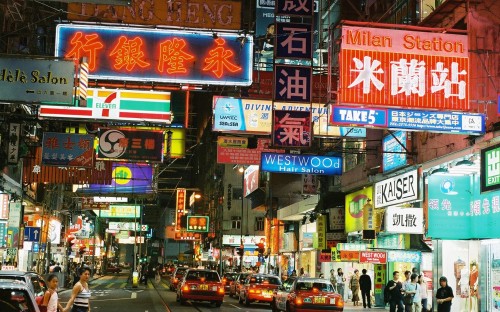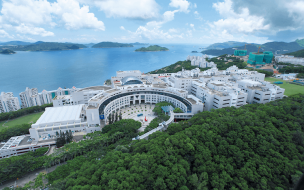Close connections to mainland China and a thriving financial services sector have helped Hong Kong's business schools internationalize.
Much of Hong Kong’s business sector has lived in the shadow of mainland China, but education in the world’s eighth largest trading economy is on the cusp of globalization.Strong ties to China, a large and thriving financial sector and free market credentials are powering the rise of Hong Kong’s business schools and universities.
The former British colony is attracting a swelling pool of globally mobile students.
The mainland contributes the lion’s share to Hong Kong’s economy and so do its students, but managers from as far afield as Spain, France and the US are knocking on the door of Hong Kong’s MBA programs.
“Hong Kong has long been a bridge connecting China and the rest of the world,” says Eric Chang, dean of the Faculty of Business and Economics at the University of Hong Kong.
According to data compiled by the Institute of International Education, a think-tank, China attracts 8% of the 4.3 million internationally mobile students, 3% lower than the world’s most popular destination, the US.
For a territory whose school education system is lauded as among the best in the world, it should come as no surprise that its management institutes are starting to catch up.
Data submitted by business schools and published in 2015’s MBA rankings show that about 70% of Hong Kong’s highest-ranking MBA programs are populated by international students.
“This is now my home,” says Alexis Bautista, a European MBA who set-up Kokonuzz, an entertainment content developer and licensing start-up, in Hong Kong. “Starting a company here is fast, cheap and easy,” he says. “The cherry on top of the cake is that we are next to the [mainland] Chinese market.”
China’s decade of fast growth, which saw it overtake the US at the world’s largest economy in 2014, has begun to slow but the strength of Hong Kong’s corporate sector is unabated.
A stable corporate governance structure ensures companies have confidence to operate in the territory. Its economy, which has topped the widely-respected Index of Economic Freedom for the past 20 years, is fuelled by the services sector.
Hong Kong acts as a gateway for China’s rapidly developing capital market. It remained unchallenged in Asia in terms of equities and initial public offerings in 2014.
Approximately 70 of the world’s top 100 banks have established a presence in Hong Kong, according to Professor Jitendra Singh, dean of HKUST Business School.
This provides distinct advantages for local educators, such as student internships with banks including HSBC and Standard Chartered Bank. “We are ideally placed to meet the recruitment, training and development needs of such a vibrant industry,” says Jitendra.
Government figures published in 2013 show that 6.1 per cent of the working population are employed in the financial services industry – more than 230,000 people.
The University of Hong Kong is able to ride the territory’s status as a financial services powerhouse, with corporate partners including Citibank and New World Development, a Chinese-listed company known for its real estate investments.
“Business schools and the business community are mutual partners,” says Eric. “Students at HKU are closer to the real market and are exposed to timely market information,” he says.
Closer bonds between Hong Kong's and the west's academia and capital markets are bringing down barriers to collaboration.
A trail of cash flowing from China to Europe has taken the same steps as the managers who are bridging companies in Hong Kong with businesses in the Eurozone.
Chinese foreign direct investment into Europe rose to $18 billion last year; double the level in 2013, according to Rhodium, a China-focused research group.
“Chinese companies are penetrating the international markets and at the same time, continue to dominate its domestic markets,” says Eric at HKU.
Interest in hiring MBA graduates who can adapt to firms with offices in both Europe and China has surged, according to the Emerging Markets Institute (EMI) at INSEAD, a global business school.
“We do see increased interest in hiring Chinese MBAs and international MBAs who speak the major Chinese languages,” says Vinika Rao, executive director of the EMI.
This is being boosted by the desire among western universities to establish campuses in Hong Kong and the mainland. Business schools in the EU and US are rushing to invest in China.
The University of Chicago’s Booth School of Business recently relocated its Asia Executive MBA program from Singapore to Hong Kong. Sydney’s UNSW Business School runs a flexible MBA program in Hong Kong.
Kellogg School of Management of the US teaches a joint EMBA with HKUST at its campus in the Chinese territory. The UK’s Henley Business School has had a presence in Hong Kong since 1985, and plans to launch its media-focused MBA there in 2016.
Eric at HKU says: “Globalisation and the increasingly close interrelations among different economies make it essential for business students to have international perspectives.”
But living expenses are high. Savills, the property agency, estimates that prime residential rents in Hong Kong average $2,446 per week.
Hong Kong is the world’s second most expensive city to live in, with $115,717 average annual costs for employees, behind only London, according to Savills’ research.
Yet this has not slowed the former British colony’s educational rise. Managers have sent results of GMAT, the international standard business school entry exam, to Hong Kong in increasing numbers.
According to data from GMAC, the body which administers the exams, between 2008 and 2012, 7,811 more tests were sent to business schools in the territory. In 2012, Hong Kong received 9519 more test scores than mainland China.
However, recent pro-democracy street protests have brought the region’s stability into question.
New business from the mainland during the protests in November fell at the fastest rate since the financial crisis, according to a survey by HSBC.
Reports have suggested the affair could put companies and students off coming to Hong Kong, but academics are seemingly unconcerned.
In a recent interview Kalok Chan, dean of the Chinese University of Hong Kong’s business school, said students will appreciate that Hong Kong enjoys freedom of expression and demonstration. “It is a good thing for them to be exposed to,” he added.
Student Reviews
One of a kind
I studied Bioinformatics at CUHK last year. It was the only Master's degree in Hong Kong in this field. This program developed my analytical skills and equipped me to be a Bioinformatician in a very practical way.
I enjoyed my year here and met classmates from different parts of the world. If you are thinking to enhance your profile, this degree program would be a good option.
general education courses, unique college system, large campus
The university facilitates multi-dimension and interdisciplinary learning. In social science faculty, we need to choose courses as our faculty package from other departments (architecture, psychology, sociology, etc.) to learn more than our major required courses. We are also required to finish general education courses, which aid our critical thinking and humanistic sensibilities. I do recommend the social science broad-based program, and the professors I met so far are all responsible and erudite.
LLM
The faculty of law is relatively new. You do not need to have a LLB to pursue a LLM, which is special. The taught programme is great for mature students who want to obtain legal knowledge.
CUHK has good teaching staff too.
Amazing Campus and Great Educational Environment
Not only is CUHK's main campus breathtaking, it provides for a good educational environment for students. The university is well-equipped with modern and up-to-date facilities to help students with their study. We have 8 libraries in total around the campus; one for media, one for architectural studies, the medical library and the law library. The Professors are always helpful and are happy to talk to students when needed.
Moreover, the college system within the university brings forth the uniqueness of CUHK. Each student belongs to a different college, and in that students are able to meet different peoples from different countries and students from different faculties.
I think CUHK provides for a well-rounded university life for all students.
exthrillating
One of the most down to earth places in HK. A great opportunity to learn and embody the local culture. Also had one the most beautiful campus in Hong Kong up on the hillside. Glad to have graduated here.
Innovative and Supportive
My university provided me with all the support I needed, and encouraged me to be up to date with all the new developments in the world. They also provided me with the incentive to excel at what I do, and they take much pride in my achievements. I have had a very rewarding university experience.
Small, New But Friendly Law School
To being with, I think the campus of CUHK is the best and the biggest in Hong Kong, with fresh air and trees everywhere.
I am an undergraduate Law student at CUHK and I think the teaching here is great, with very friendly and nice professors and the new Lee Shau Kee Building.
In terms of the courses offered by CUHK, as one of the largest universities in Hong Kong, CUHK is an all-rounded university, offering a wide range of courses to students. Students may take the introductory courses of discipline other than their own major, or even declare a minor.
For law electives, due to the small amount of intake, the variety of law electives are not that huge. However, the Faculty is offering some international programmes, which can be treated as law electives, but at the same time, provide us with an opportunity to travel and know more about the legal system of another country.
The career support from the Faculty of Law is also amazing. The Faculty will organise CV Sessions and talks on how to get an internship from law firms or mini-pupillage from barrister's chambers. Each student will also have a Distinguished Professional Mentor, which is a current legal profession, providing us with practical advices and updates of the legal field.
Finally, from my personal experience, I think the students in CUHK are friendly and genuine. As Law students, competition is inevitable for grades, GPAs, vacation schemes and training contract. However, I think the competition in CUHK Law School is a positive one, in a sense that help us grow together, instead of fighting with each other no matter what. That is the biggest reason why I am having a very good time here in CUHK Law School.
A place to explore your interests
As a law graduate from CUHK (both undergrad and post-grad), I realise that I had many opportunities to explore my areas of interests (legal and non-legal both). The faculty/university requires us to take a certain number of non-law electives, and offers a plethora of courses to choose from. Personally, I took 3 modules in Korean --I can't say it's made me highly proficient, but it's definitely given me a good foundation (I can walk into a Korean restaurant and confidently order food, at the very least). The fact that language courses are offered also provides students who are more financially constrained an opportunity to learn a language without having to shell out a premium for a decent language course. On top of that, we have a range of law electives as well. I know of classmates who have developed lasting interest in different areas of law because of the electives they took in school. The two electives that I would say have changed me is (i) mooting and (ii) family law. I think my experience in an international commercial arbitration moot competition has helped tremendously in formulating legal arguments and legal writing. On the other hand, taking a family law elective has made me very interested in the family law practice, especially in terms of child rights. For these experiences which I have gained, I'm grateful for the opportunities provided by the school.
One main issue most students I know have is with the way our GPA is calculated and the lack of transparency in terms of how the honours system works. As our GPA is marked on a curve. it's highly unrepresentative of what we have achieved as individuals. Given that our GPA is the only criteria that is looked at when we apply for the compulsory post-graduate law course (mandatory should we want to practise law and/or be trainees in Hong Kong), it will put our own students at a distinct disadvantage when we compete for limited spaces with students from schools where GPA is not on a bell curve.
Valuable time in CUHK
I like the learning environment and people at CUHK. Surrounded by hills and Tolo Harbour, CUHK provides a balance between nature and hustle. You can always escape from the busy study life and meet your friend around the big campus for different activities.
The largest and great university in HK
CUHK is one of the top universities in Hong Kong and is ranked in the QS World University Rankings 2025. It consists of eight colleges, creating a diverse university experience with a wide variety of activities.
The campus is the largest in Hong Kong, featuring its own MTR station and six regular shuttle buses (1A, 1B, 2, 3, 4, 8) along with three "meet-class" school buses to provide efficient transportation between classes.








